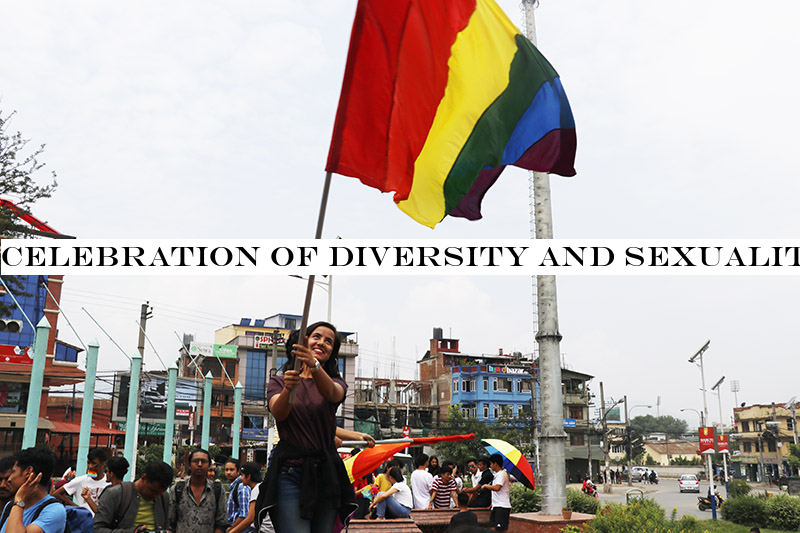INSUBCONTINENT EXCLUSIVE:
&I kissed a girl and I liked it…..&
&My brother is gay and that okay.&
The first pride parade taking place in the pride month of June
in the country witnessed participants swaying their bodies to a diverse range of pride anthems in Maitighar (Fibwa-Khya) today.
Hundreds of
participants with decorative face paintings (being done on the spot by some participants themselves), colourful umbrellas, and vibrant
clothes flooded the Mandala area in anticipation of the parade
Performers danced in the square while the crowd waved large pride flags in excitement.
A participant paints the face of another participant
while taking part in Nepal first pride parade during the pride month, in Kathmandu, on Saturday, June 29, 2019
Photo: Ankit Khadgi/THT Online
The high-spirits, positive vibes and encouraging smiles welcomed everyone making the first pride parade more
a celebration of diversity and intersectionality
The combination of people of various nationalities, ethnicities, sexual identities, and individuals with disabilities was a vital part of
the parade.
The parade organised by Queer Youth Group (QYG) and Queer Rights Collective in collaboration with various organisations rallied
from Maitighar (Fibwa-Khya) to New Baneshwar (Khuntoo).
Rukshana Kapali, a transgender social activist and a member of QYG was overwhelmed
with emotions seeing the community come together to celebrate love and each other.
Rukshana Kapali, a transgender social activist and a
member of QYG, stands with other participants holding a banner in Nepal first pride parade during the pride month, in Kathmandu, on
Photo: Ankit Khadgi/THT Online
When asked why Marginalised Orientations, Gender identities, And Intersex: MOGAI (pronounced: muggy), a new
acronym for gender minorities was used for the parade, Kapali shared that they were looking for a term that included identities beyond just
what the acronym &LGBTIQ& stands for.
This parade differed from the Pride March organised annually by the Blue Diamond Society that takes
place during the festival of Gaijatra
Kapali explained the reason for organising a pride parade in June is to increase the visibility of the community and to provide a separate
platform for members to celebrate their sexualities.
&While the support for the LGBT community is growing, there is a lack of awareness
about the various sexualities like asexuals, pansexuals, bisexuals, and gender fluid,& shared Kim Thakuri, a participant who identifies as a
non-binary pansexual.
One of the main aims of the parade was to shed light on the specific gender identities by holding placards that
defined the wide range of sexual orientations, in not just Nepali and English, but multiple ethnic languages.
The parade also saw
support from straight and heterosexual individuals who identify as allies of the community
&I am extremely happy to be a part of the parade and it amazing that my straight and cisgender friends are here to support me,& said
Thakuri.
&Loving someone is not wrong
Everyone should be allowed to love whoever they want,& answered Praju Dotel an ally when asked why she was attending the event
While the urban areas are becoming more inclusive of the LGBT community, she expressed the need to spread awareness about the issue in
remote areas of the country as well.
Although Nepal legalised homosexuality in 2007 AD as a result of the Sunil Babu Pant and Other vs Nepal
Government court case, the LGBT community still struggles for equal participation and representation in various walks of life.
The new
Nepali Civil and Criminal Code (Muluki Ain) that went into effect in August 2018 fails to recognise same-sex marriage and defines marriage
as being a union between two people of the opposite gender — creating a hostile environment for LGBT couples.
&There has always been a
romanticisation of Nepal as being one of the more tolerant countries in Asia; however, the ground reality is very different
The laws are not actually implemented making it more difficult for our community,& said Kapali.
She also discussed the importance of
including topics surrounding the LGBT community in the Nepali curriculum to not just make students familiar with the concept but also make
students within the community more comfortable in their school surrounding
Looking at definitions of ‘family& beyond just a heteronormative lens might be a good first step, Kapali pointed out.
&I feel like these
I know they won&t judge me and I can fully be myself here,& said an enthusiastic participant, Jyoti Shrestha, who identifies as gender
fluid.
Talking about the stigmatisation of the LGBT community, Shrestha highlighted the prevalent gender-roles in our community that hinder
the movement of Nepali society away from inclusivity of gender minorities.
&People here don&t know the specific terms used and although they
know we exist, there is still taboo surrounding this topic,& continued Shrestha.
The pride month also marks the 50th anniversary of the
Stonewall Riots in New York City, that acted as a tipping point for the Gay Liberation Movement in the United States.
The first of its
kind, this pride parade boasted large youth participation and successfully delivered the message of equality, diversity and
intersectionality in the Nepali context.
&Gradually people are becoming more aware and now I can connect with other people from the
So, I don&t feel like I am alone anymore,& said Shrestha, happily embracing their sexuality through their new buzzed hair-cut.
The post
Celebration of diversity and sexuality: country first pride parade appeared first on The Himalayan Times.

